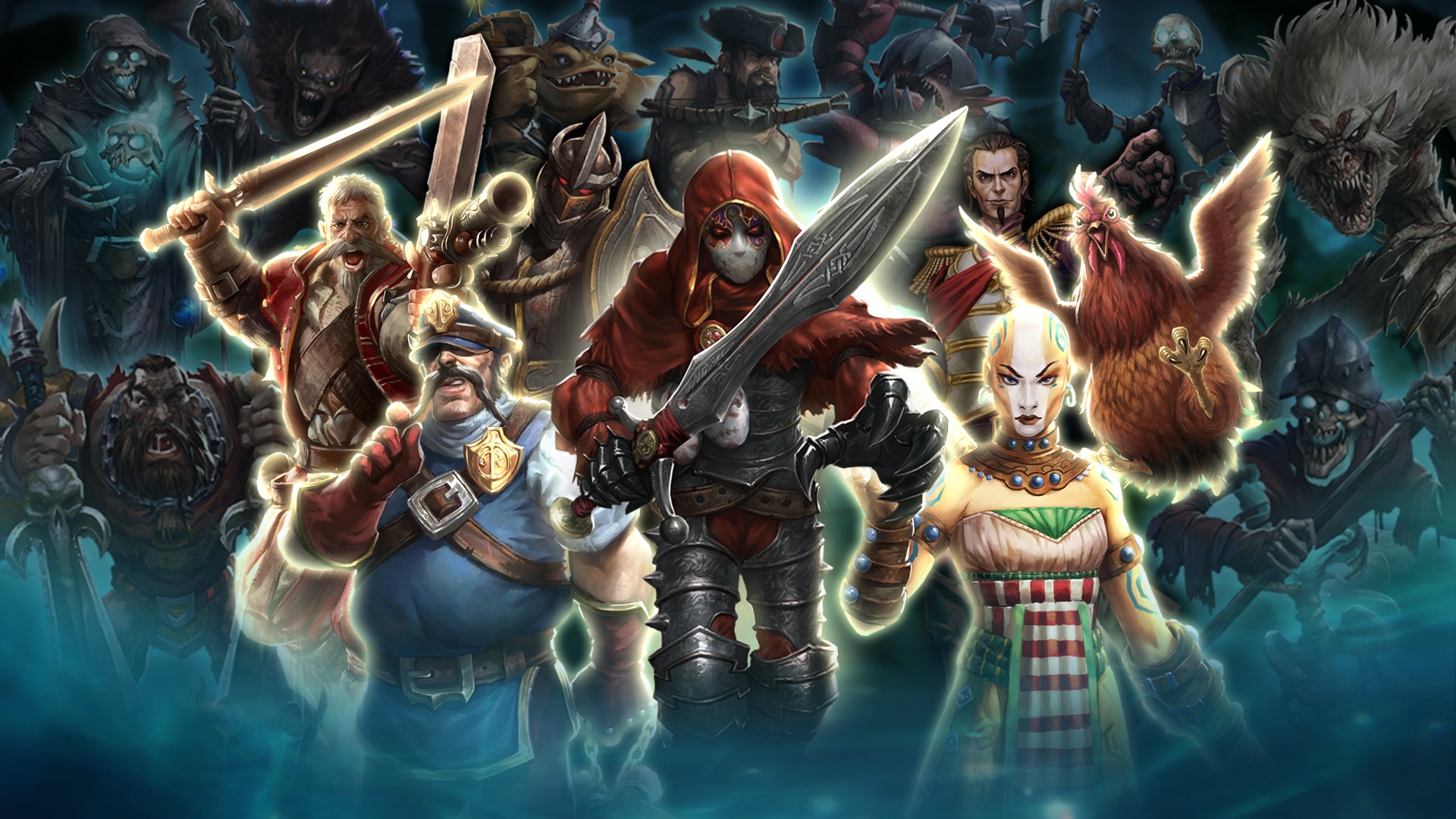Lionhead Studios was founded in July 1997 by Peter Molyneux, Mark Webley, Tim Rance and Steve Jackson - the majority of which were former Bullfrog Productions employees and left shortly after it was acquired by Electronic Arts to form Lionhead. The studio was named after Mark's hamster that sadly passed away a week prior to them forming.
Despite their debut being the 2001 real-time strategy with a God-game twist "Black & White", which saw an official sequel four years later alongside the film industry simulator "The Movies", Lionhead Studios aren't known for much besides the Fable franchise, the first of which released in 2004 for the Xbox. A series of open-world light RPGs set in the fantasy land of Albion, an old-English feeling world with charming personalities and silly humour that feels right out of a child's fairy tale book.
After being acquired by Microsoft in 2005, Lionhead Studios would essentially focus all of their efforts on Fable titles, both large and small, and everything non-Fable related would be publically cancelled or go radio silent long enough to fade from public interest. The Fable games that were released, while selling well, were mostly surrounded in controversy due to missing or butchered features that were teased leading up to release by studio head Peter Molyneux, who had a tendency to get prematurely excited for features they were working on, so much so that he announced them as expected features before the studio even had time to start properly developing them.
While it might all sound doom and gloom, most of the Fable titles are fondly remembered by millions of fans, even delisted and broken titles are still being played online today. Socially, the series has also been way ahead of its time to varying degrees by featuring prominent female and black characters, polygamous relationships, cross-dressing, transgender options, same-sex marriage/adoption, gender fluidity and even pro-vegetarianism. This article's purpose is to celebrate the franchise, appreciate everything it did wonderfully and recognise the mistakes that likely lead to the demise of its parenting studio and the lack of a mainline sequel for over a decade... until now.
Fable
Known during development as both "Project Ego" and "Wishworld", what would eventually be called "Fable" was released in September 2004 for the original Xbox console. Winning more than 50 awards and becoming the fastest-selling Xbox game at the time of release, Fable sold and was received incredibly well.Players and critics enjoyed the tongue-in-cheek humour, beautiful landscapes, charming characters, freedom over storyline choices and simplified RPG mechanics. The game wasn't without its drawbacks, however - with many feeling the game was too short, too linear and featured clunky-at-best combat.
Peter Molyneux was known at the time to speak to the press about the flurry of features that were meant to eventually make their way into the game, such as the ability to have children and plant growable Oak trees, he even went as far as to say that Fable would be the greatest game ever. Many of his promises fell short and despite being a great RPG with a lot to offer, I don't think many people would consider it to be the best game ever.
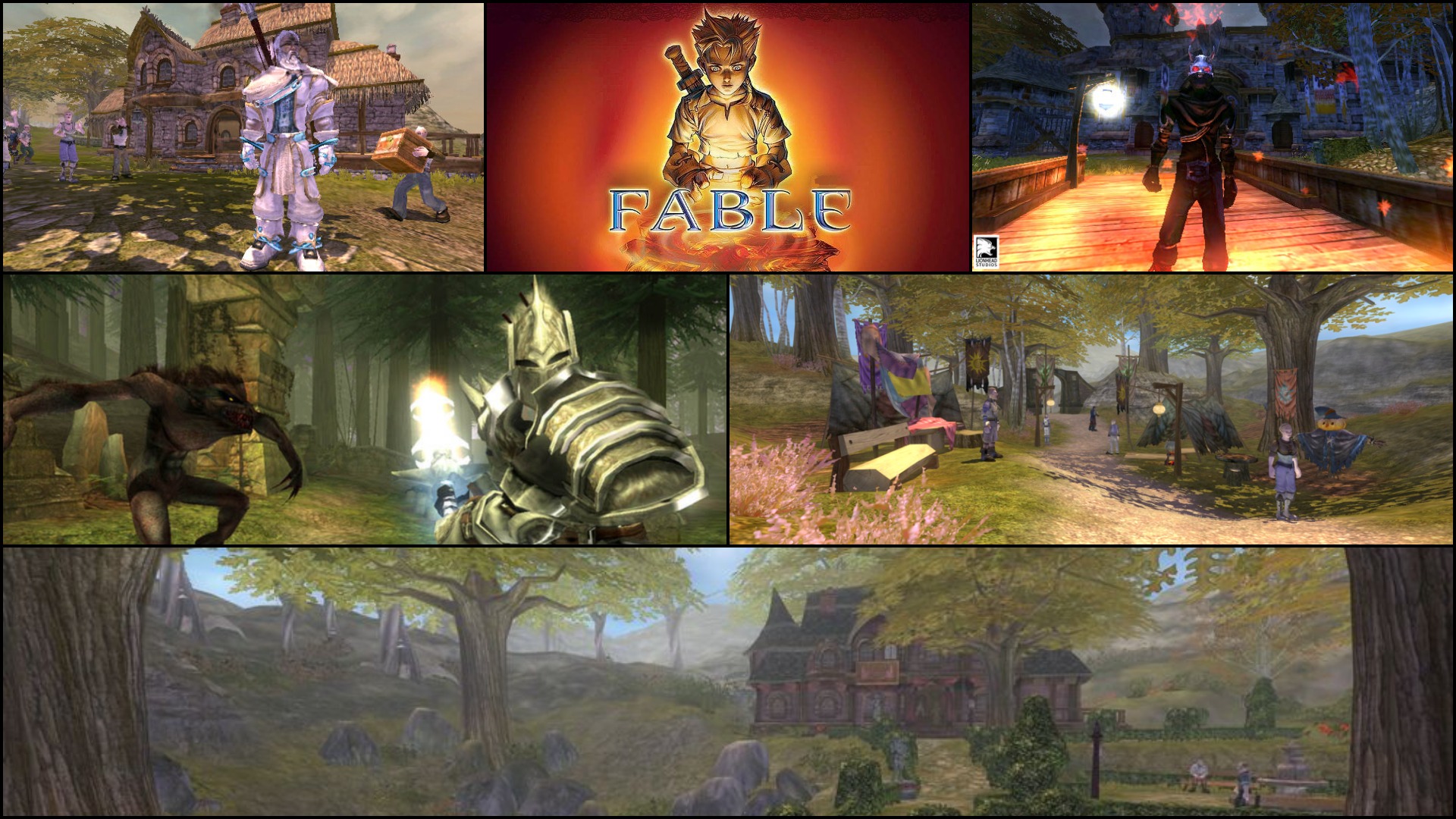
Fable: The Lost Chapters
Following the release of the original Fable, Lionhead got to work developing further content to deliver as "The Lost Chapters", which was released exactly a year after the original game in September 2005 for Xbox and Windows - A Mac version landed more than two years later in March 2008 (just months before the full sequel arrived).The main additions over the original in The Lost Chapters are more treasure chests and demon doors, new armour and outfits, new spells and weapons, new locations and characters, improved graphics and new mini-games and quests, the latter of which take place one year after the events of the main game.
Besides adding more content and locations to the game, The Lost Chapters also introduced a larger audience to the world of Albion, releasing for the first time on Windows and Mac computers and giving Xbox users another reason to give the game a chance. The success of Fable and its expansion caught the keen eye of Microsoft who would go on to acquire the studio in 2006, making Fable an Xbox stable for years to come.
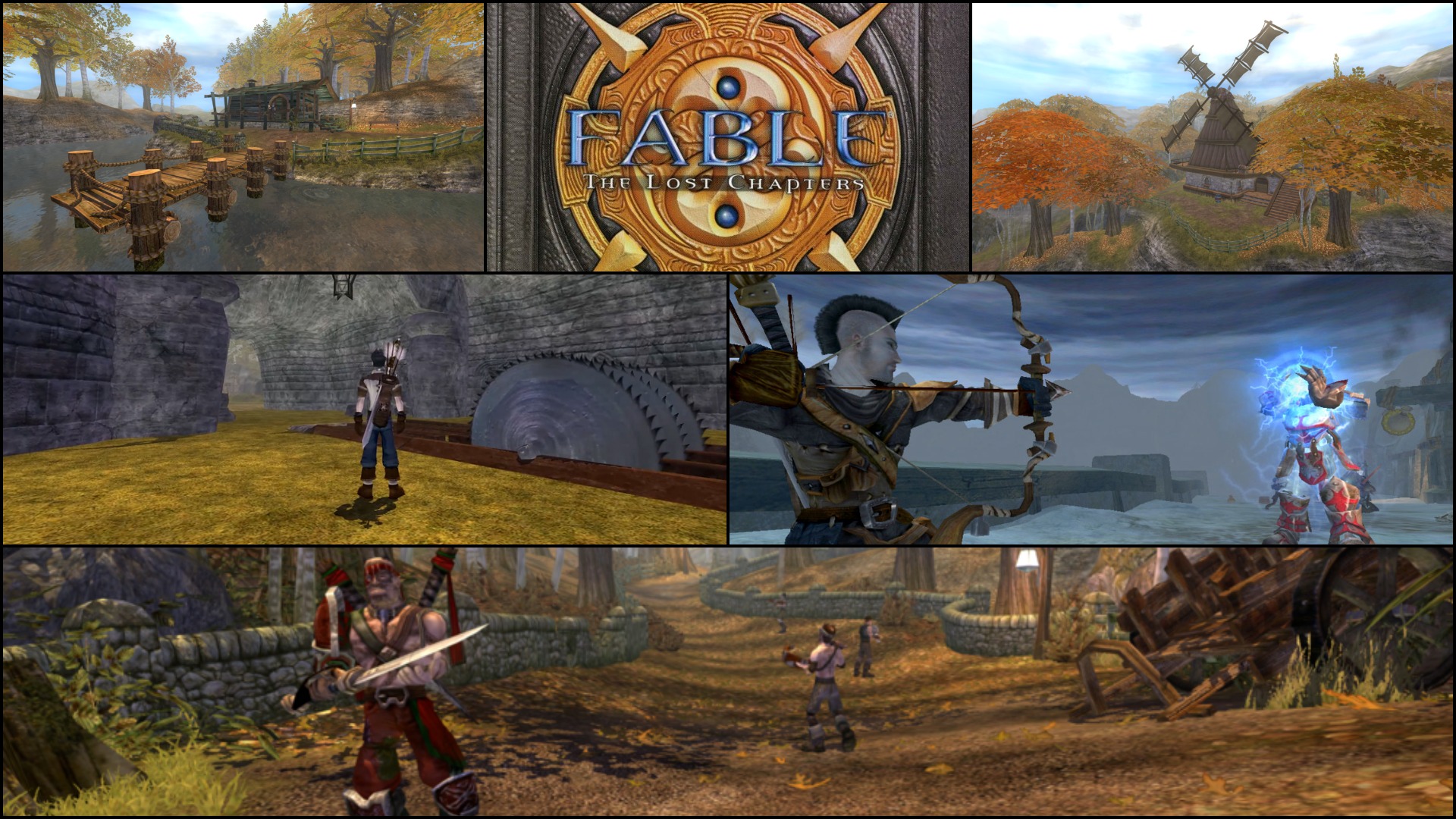
Fable II
Releasing in October 2008 exclusively for the Xbox 360, Fable II is the only main entry in the franchise not to receive a PC release, however via backwards compatibility and Microsoft's XCloud it is now technically possible. Set 500 years after the original game, Fable II resembles a more colonial setting than the first game's more medieval world. While magic and melee weapons are still featured, Fable II is the first to introduce guns to the franchise, replacing the bows of the original. A pet dog companion also features in the game that helps you locate treasure and fight enemies.Being the first Fable title on the next-gen Xbox console, Fable II had much-improved graphics and gameplay. Co-op play also debuts in the sequel via local, system link and online with the second player choosing a pre-set henchman to join in, however second players had limited story interaction and must remain close to the first player. Besides co-op, Fable II was also a borderline MMO, with other players seen in your single-player game as floating orbs that could be interacted with and spoken to.
Fable II was praised for almost the same reasons it was criticised. Many loved the breadcrumb feature that guided your character between quests, while others felt it diminished the emphasis on exploration and even when it was used for its purpose, it didn't work very well. Many enjoyed the switch to faster-paced gunplay while others felt it modernised Fable too quickly, loosing some of its original charm. Almost universally praised however was the voice acting, featuring such talent as Zoë Wanamaker and Stephen Fry to name but a few.
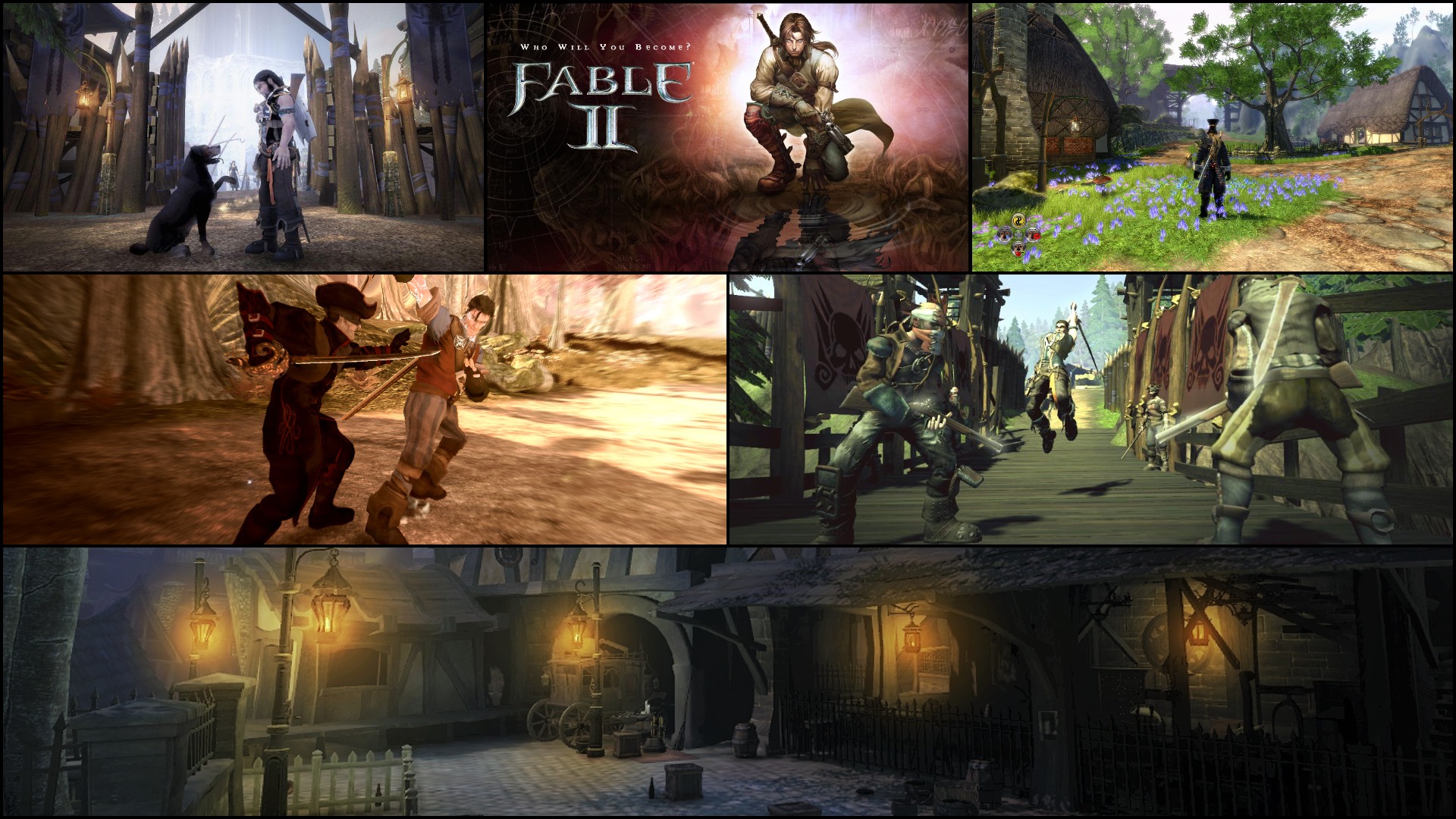
Fable II Browser Games
To help promote the upcoming Fable II release, Lionhead commissioned and released three web-based games, named 'A Hero's Tale' and 'Chicken Kickin' followed by the simply named 'Fable'. Released around 2008, not much is known about these titles as they have since been made unplayable due to the downfall of Adobe Flash Player.A Hero's Tale was essentially an interactive puppet show that acted as a prequel to the main storyline in Fable II and even allowed for items to be unlocked for use in the Xbox 360 game.
Chicken Kickin' was found in the Extras menu of A Hero's Tale. Your task was to kick chickens as hard as possible by clicking the power meter at the correct time, you had a minute to kick as many as possible to rack up points and earn gold.
Fable as it was simply known, was a pop-up style storybook with interactive good and bad choices per page that told the story of your hero and offered more information about the game.
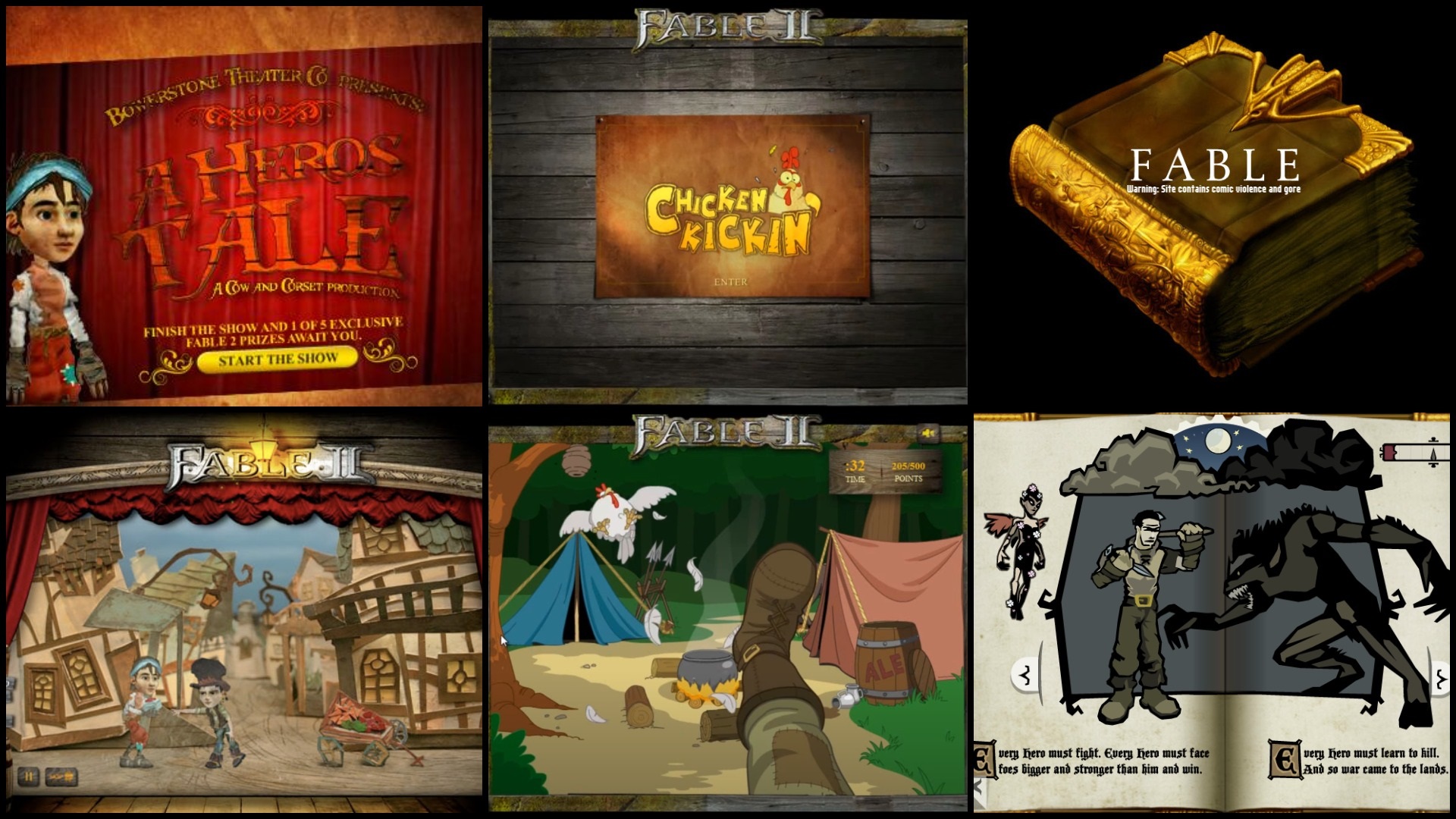
Fable II: Pub Games
In yet another attempt to build hype for what would be the upcoming Fable II in 2008, Microsoft commissioned Carbonated Games to work in partnership with Lionhead to develop a selection of mini-games for the Xbox 360 named Fable II: Pub Games after the various table-top games you can play in pubs all over Albion in Fable II. Any items or gold earned in-game could be transferred to your character in the main game.The first of the three experiences you will find in Pub Games is Spinnerbox, which is essentially just a glorified slots machine, but with combos and special modifiers to spice things up. As you have no control over which slots are spun, Spinnerbox is 100% a game of chance.
Next is Keystone, which is a mixture of Roulette and Craps. You place bets on particular numbers, colours, shapes etc that the dice can land on, with the game ending when all or certain arch tiles are removed from the board, after each dice roll more bets can be placed.
Leaving the best for last, Fortune's Tower is Pub Games' more enjoyable offering. While a little tricky to learn at start, the basic premise is that you draw rows of cards, trying to avoid adjacent duplicated numbers, relying on limited knight and tower cards to save you. Unlike the previous more luck-based games, Fortune's Tower actually takes some strategy and careful thought of when to press on and when to cash in to make the most overall profit.
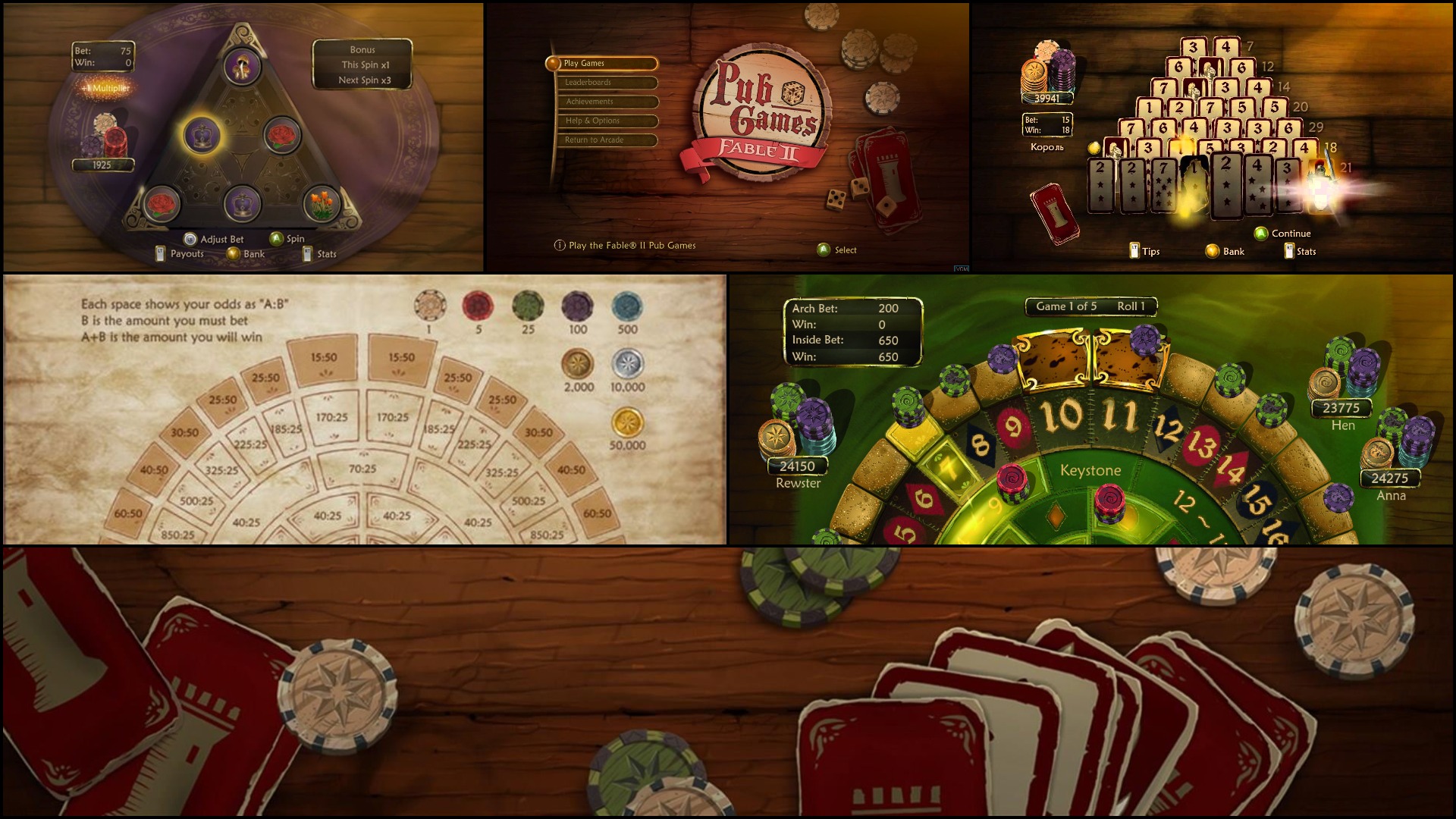
Fable III
The success of Fable II pathed the way for Lionhead to immediately start work on its sequel. Releasing for Xbox only two years later in October of 2010 but this time bringing the series back to PC, releasing for Windows in May of 2011. This time set just 50 years after the events of Fable II and taking place in the industrial age. As the player you must influence allies until you have an army large enough to overthrow the ruler of Albion, making difficult and world-changing choices as part of your new leadership responsibilities. You'll balance the wellbeing, finances, public opinion and local industry of your Kingdom going through its most difficult era.Fable III brings many changes to the series in an effort not to fall into the rut of being the same game as its predecessors. Harsh consequences to your choices in the game will change how the world and inhabitants around you change or react. Co-op is now fully fleshed out and allows the second player to use their own hero and dog. The XP system has been scrapped in favour of earning Guild Seals and spending them on upgrades. The menus, weapon selection, world map and even the user interface was also moved to an interactable Sanctuary in an attempt to remove clunky and pace-dampening menus.
While generally well-received, Fable III has received its fair share of criticism since its release. Many appreciate its rich and well-told story but felt it was so short that you were left unsatisfied just as things were getting exciting. The gameplay was widely reported as oversimplified, with less RPG and more adventure elements, but most only had positive things to say regarding the graphics, music and humour. The voice acting is also universally praised with talents such as Simon Pegg, Michael Fassbender, Jonathan Ross, Bernard Hill, John Cleese and the return of both Zoë Wanamaker and Stephen Fry who lent their voices to characters in Fable II.
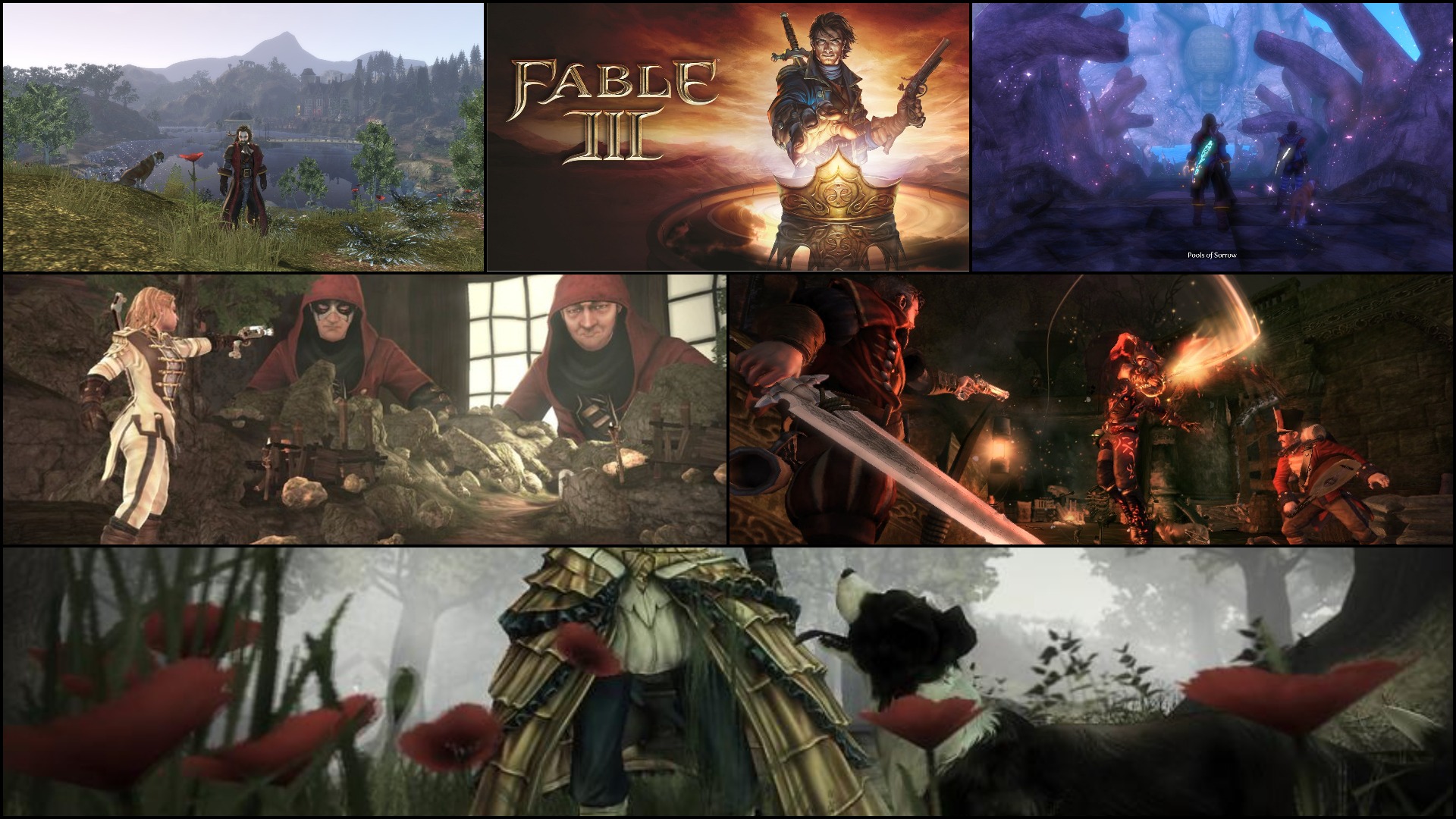
Fable III: Kingmaker
Fable III: Kingmaker was a companion game released for Android and iOS devices in 2010 in Europe. The game used the player's real-world GPS locations to flag territories under the control of either the Royals or Rebels (depending on which faction you were part of). Every location marked would earn gold that could be sent to your Fable III character.On 29th December 2010, the game was ended with the Rebels having majority control of five countries and the Royals only controlling two. 3.5 million flags were placed and over 5 billion gold was distributed among all the players. It's unknown why Lionhead ended functionality for the game so suddenly.
Such game ideas are a lot more common these days with titles like Pokemon Go making GPS functionality a global phenomenon. It's a shame Kingmaker only lasted a few short months, as it's clear the title had the potential to be something more involved and a nice distraction for Fable fans.
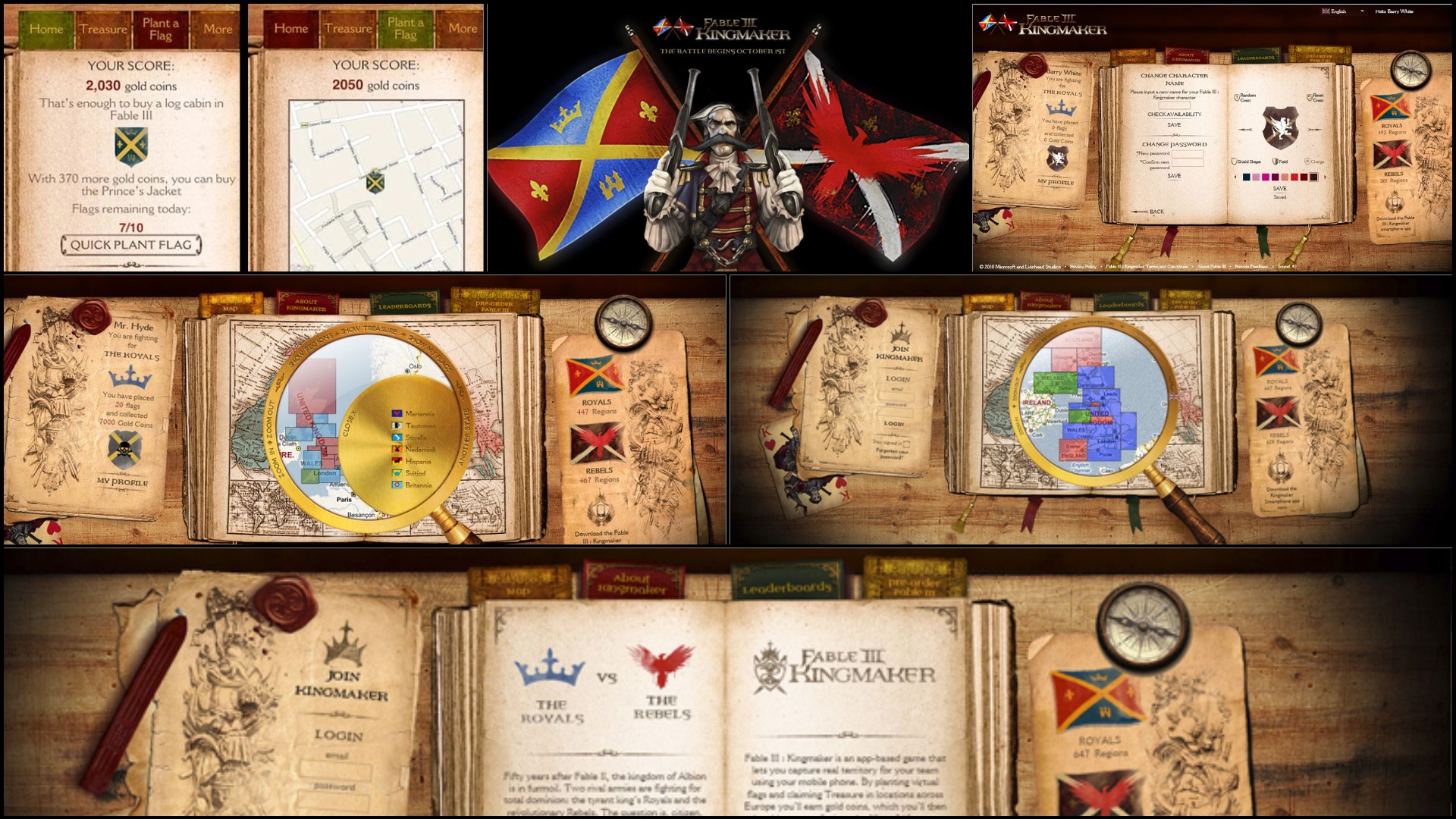
Fable III: Villager Maker
While not strictly a game, Fable III Village Maker was an interactive web application that had functionality exclusively for people who pre-ordered Fable III. Using a redemption code, Villager Maker allowed you to design your own in-game NPC that would offer you one of two quests, depending on whether you made them a good or evil character.Besides the looks and clothing of the character, you were also able to select their name, gender, voice, birth-place and personality traits. Besides the quest, you were also able to marry and/or kill the character, just as you were able to most other NPCs in the game.
Creating the character and completing their quest awarded you with gold and guild seals to spend on upgrading your character. The application is no longer accessible and as a result, the ability to complete either of the quests is lost forever.
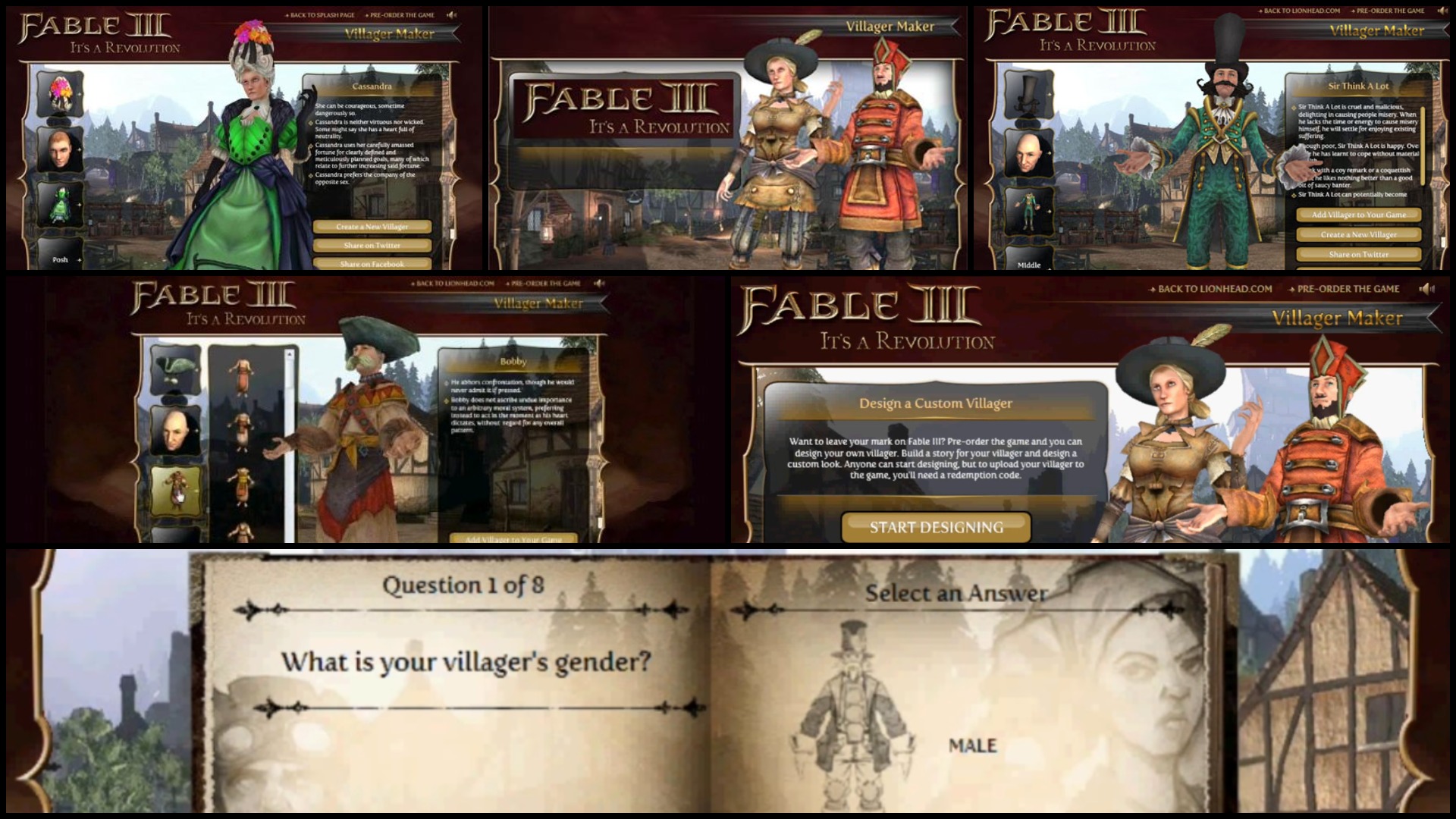
Fable: Coin Golf
Fable: Coin Gold was developed by Ideaworks Game Studio and released exclusively for Windows Phone devices in March 2011. The aim was to knock a puck around various Fable-themed boards in as few hits as possible, avoiding certain obstacles and dangers. Each level offered a bronze, silver and gold ranking for reaching certain scores.While the feature was still functional, you could earn and send gold from Coin Golf to Fable III on Xbox or PC. Each of the three chapters also unlocked a particular weapon in the main game, namely Donna's Kebab Sword, the Hammer of the Whale and Thundaraga Sword.
Even though ads for the game's existence could be seen while playing the Traitor's Keep DLC, the game's success was held back by its exclusivity to Windows Phone devices, which was still struggling to gain a substantial userbase at the time. A shame as it's one of the better Fable mini-games.
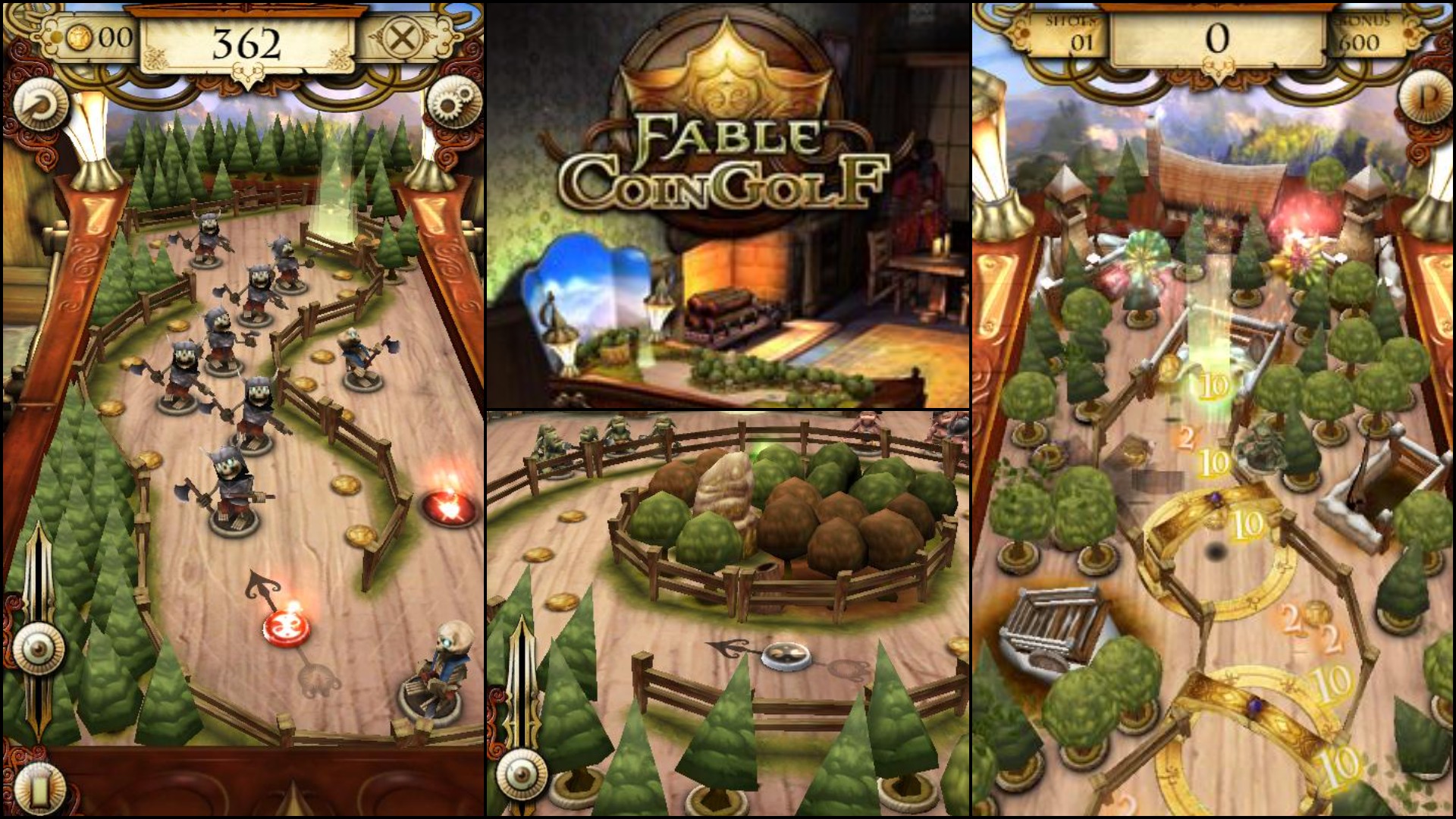
Fable Heroes
Fable III's release in 2010 marked the start of a very over-saturated four years for Fable titles, despite being the last main entry in the franchise. Fable Heroes was among this cluster of titles, releasing in May 2012 on the Xbox 360 as the first family-friendly rated full game in the franchise. Unlike previous games in the Fable series, Heroes is a side-scrolling, hack-and-slash, 4-player co-op game. Featuring playable puppet-esque characters and enemies found in Fable, Fable II, Fable III and the Xbox Kinect exclusive, Fable: The Journey.Between levels, dice would be rolled to travel the path of a board game that would allow for certain characters and powerups to be purchased for use in-game. Any gold earned could be transferred to Fable: The Journey to be converted into XP. Unique items could also be unlocked for use in The Journey and playable Theresa and Gabriel characters could be unlocked for use in Heroes by playing and completing the main storyline of The Journey respectively.
Fable Heroes received mostly mixed reviews with complaints mentioning its basic and uninspired gameplay, lack of diverse content and limited storyline. Praise came from its pick-up-and-play co-op functionality, simple gameplay, cute art style and relatively cheap price. Fable Heroes never arrived on PC but eventually became backwards compatible on Xbox One and Xbox Series X.
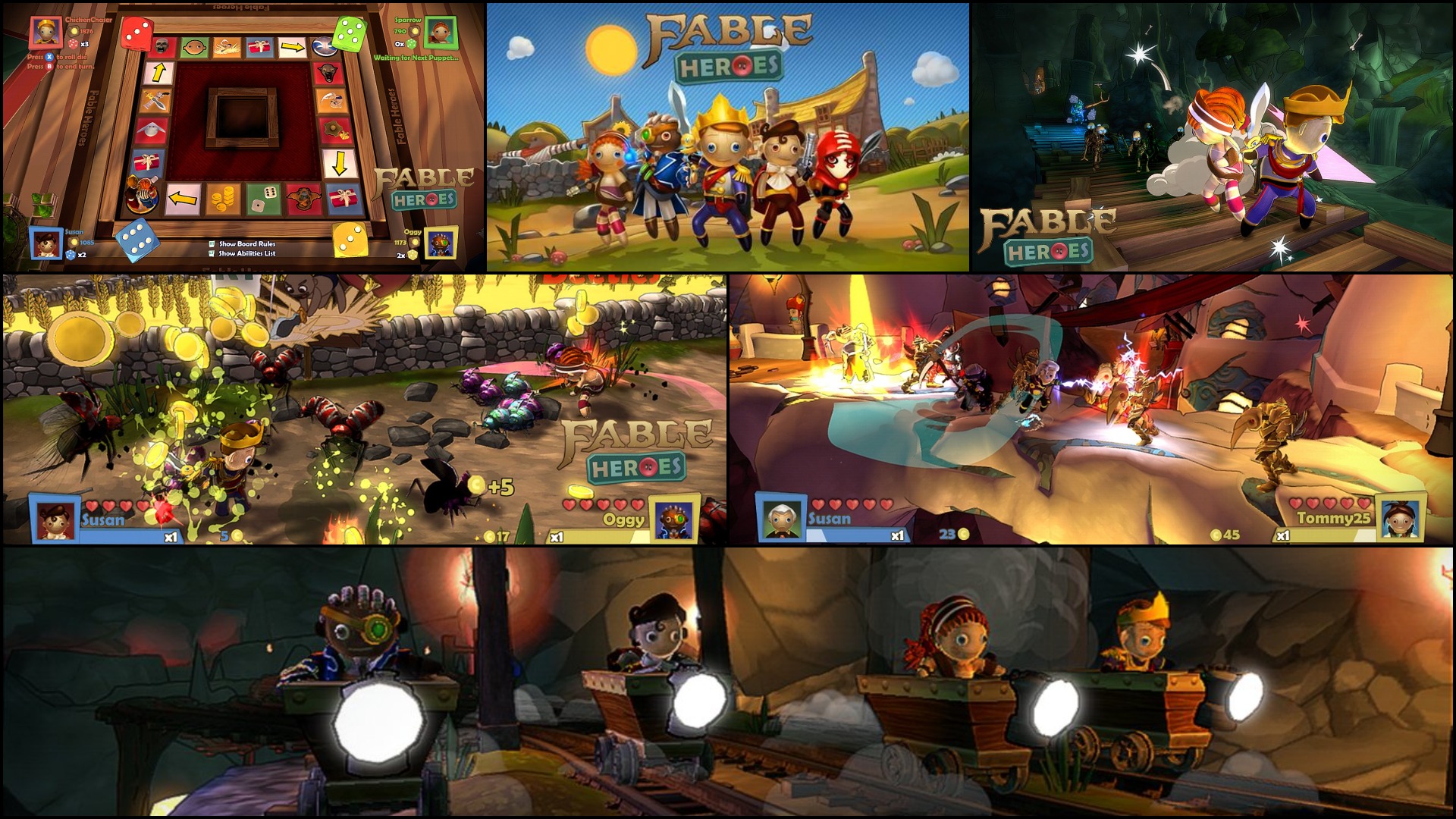
Fable: The Journey
Following Fable Heroes' release by just a few months in October 2012, Fable: The Journey released exclusively for the Xbox 360 with a strict requirement to play using Kinect sensor, not even limited controller-based play was supported. The game is set 50 years after the events of Fable III, in which the results of events in that game (but not your specific choices) can be seen during The Journey. You play as a dweller called Gabriel and are tasked with saving and restoring the power of a wounded Theresa, one of your spiritual guides from the previous games.With The Journey's switch to Kinect-based controls, the style was shifted from an open-world RPG, to an on-rails linear story-based experience. Experience earned in-game could be spent on upgrades and changes to your spells, this can be sped up by transferring gold from Fable Heroes and exchanging it for XP in The Journey. The majority of the story is spent in or around your horse and cart and later on interacting with Theresa and others, building your relationships with specific characters enough that you care what happens to them in-game.
Fable: The Journey also received relatively mixed reviews, despite the love and care that was evidently put into the game by Lionhead, critics believed that a story and gameplay rich series like Fable, could only be translated so well to motion-based controls. The technology limited its potential and while many felt Lionhead probably did their very best, it just simply wasn't enough to make The Journey stand tall in the sea of mediocre motion-controlled games swamping the market at the time.
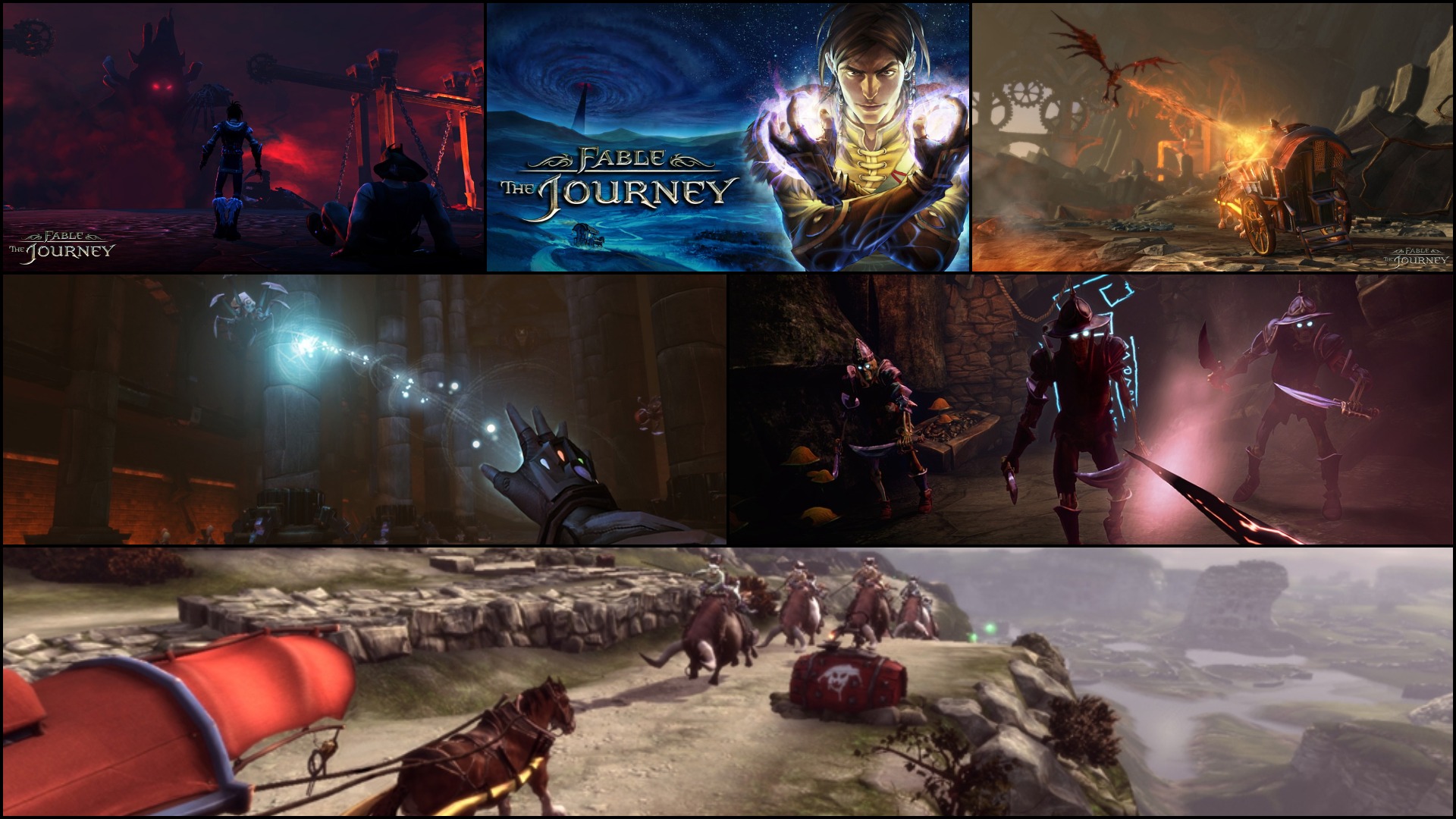
Fable Anniversary
Fable Anniversary was released in February 2014 for Xbox 360 and September 2014 for PC. Not counting Villager Maker, Fable Anniversary marks the sixth game in the Fable franchise to release in a four year period (III, Kingmaker, Coin Golf, Heroes, Journey and Anniversary), even if you remove the smaller titles, that's still four pretty substantial games in four years. Going back to the series' roots, however, was a welcome one, as many still consider the original game to be the best the franchise has to offer; before the difficulty was essentially removed and the lines between RPG and adventure were made so blurry.The PC release marked the 10th Anniversary since the original Fable game, with a purpose to feed nostalgic fans of the game that started it all, and introduce new fans to the series in the best way possible. While the first Fable was a great game, it hadn't aged perfectly well. Improved were the graphics, receiving 1080p resolution, widescreen support and better lighting and effects. The user interface was redesigned and the save system improved and expanded upon. All of the Lost Chapters content was included, alongside achievements and even optional DLC packs for outfits and weapons.
Fable Anniversary received mixed to positive reviews, while most agreed the graphics and visual improvements were a welcome addition, clunky controls, a still messy interface and unfixed bugs prevented the game from feeling like a truly modern evolution of the original. Many also felt the modding functionality offered for the PC version of the game enforced too many restrictions and strangled the creative freedom of modders, ruining any chances of mods that would keep the fanbase alive and expand beyond the game's original scope.
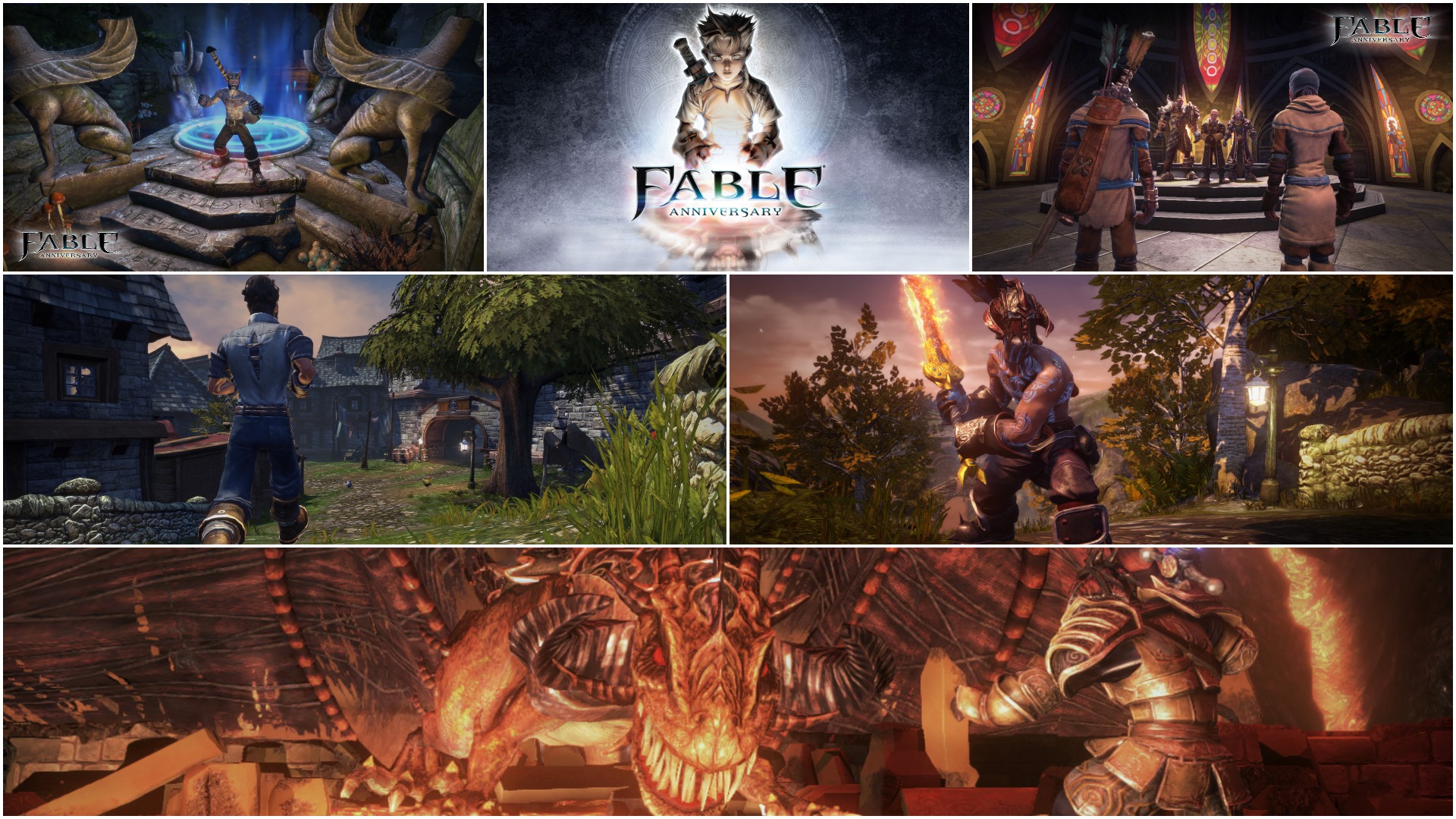
Fable Legends
This is the first title covered in this article that details a Fable game that was never actually released beyond a short, closed beta. Announced in 2013, set 400 years before the events of the first Fable, Legends would have been a relatively unique title at the time, borrowing elements from MOBAs, MMOs, 4v1 co-op, free-to-play, always online, cross-play and live service games (for better or worse). Set to task four heroes against one villain, with a social hub area between games for players to socialise and play pub games.Fable Legends was ambitious and reportedly one of the most expensive game cancellations ever, costly seven-billion dollars in development up to that point. If Fable Legends was released today it would be seen as piggy-backing off many modern trends in video gaming, but at the time Lionhead was trying to create something so fresh to the industry that its failure could be seen as a result of being too ahead of its time. The result was stretched development cycles and consistently pushed back release dates, announced on three separate occasions to be landing in 2015, 2016 and 2017, before being cancelled entirely in March 2016.
No one knows for sure why Fable Legends was cancelled, but the ramifications of its demise were felt in the weeks following when Microsoft announced the closure of Lionhead Studios, resulting in a ten-year gap between the release of Fable III and the announcement of any main entry or reboot in the series, which was eventually teased in 2020. One can only ponder where the franchise would be now if Legends was given the chance to release to the world with all its unique and interesting features in place.
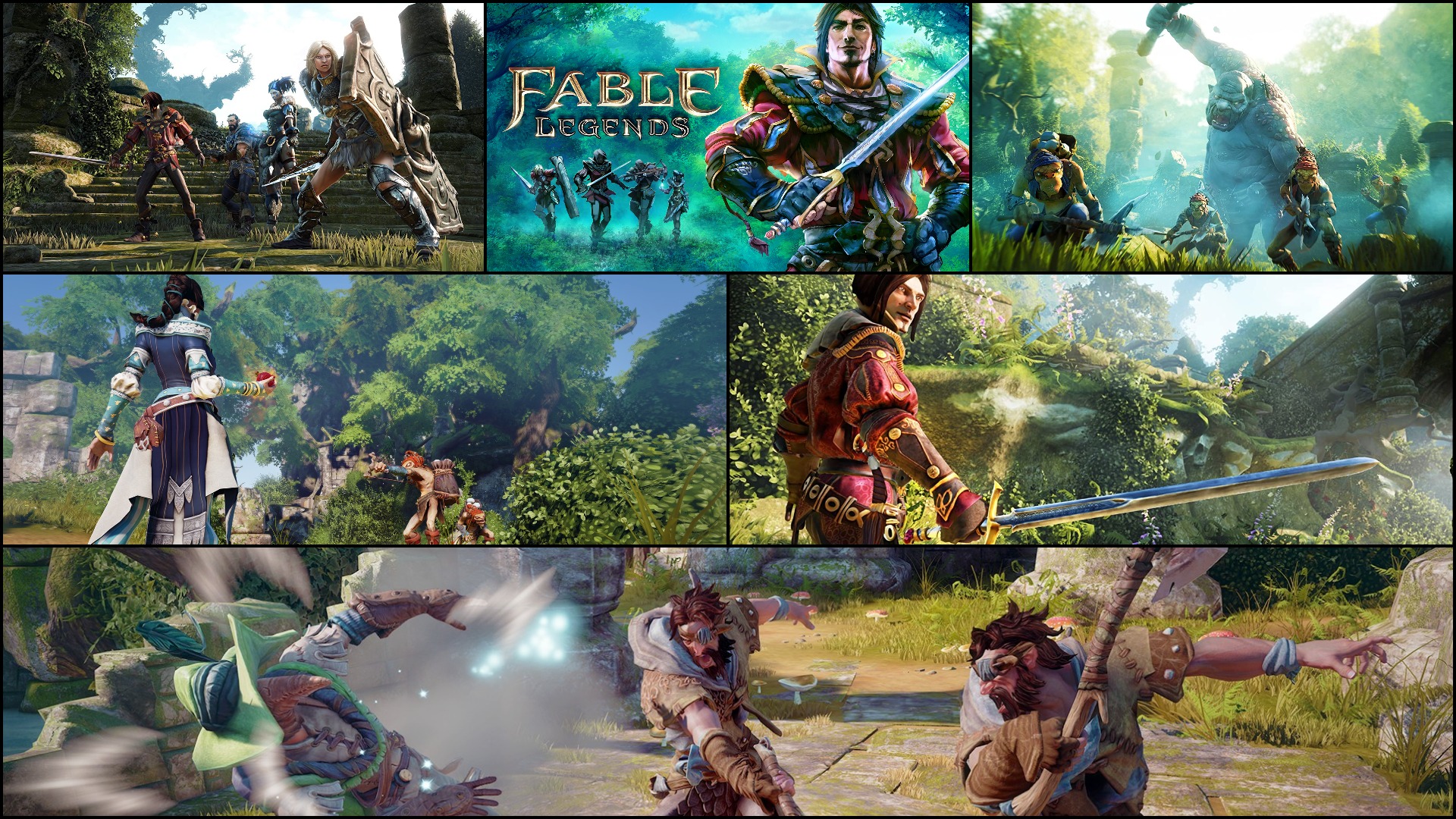
Fable Fortune
Following the closure of Lionhead Studios, certain ex-employees would go on to form Flaming Fowl Studios and secure the license to the Fable name to develop a collectable card game, presumably after the overwhelming success of titles such as Hearthstone and Gwent. After a failing Kickstarter campaign in June 2016, the developers secured outside funding and began development, releasing to early access on Xbox and Steam in July 2017, followed by a full free-to-play release in February 2018.In January of 2020, Flaming Fowl announced they were ceasing development of the game and would be shutting down its servers on 4th March 2020, citing lack of interest and a dwindling playerbase. The basic gameplay involved building your deck with various characters, enemies, weapons and powers from the series that would change depending on your morality. Fable Fortune featured co-op play that included boss fights and team tactics which was fairly uncommon in card-based games.
While the closure of the Fable Fortune servers was a sad moment, the biggest loss was the ability for the game to be played at all. As the title was free-to-play the single-player elements still relied on servers to deliver micro-transactions, causing the game to essentially be lost to the winds after closure, this marks Fable: The Journey from 2012 as the last unique title in the series that is still playable today, and even then you need a rare and gimmicky camera and arms of steel to play. Flaming Fowl Studios have since moved on to developing a digital adaption of the popular board game Gloomhaven.
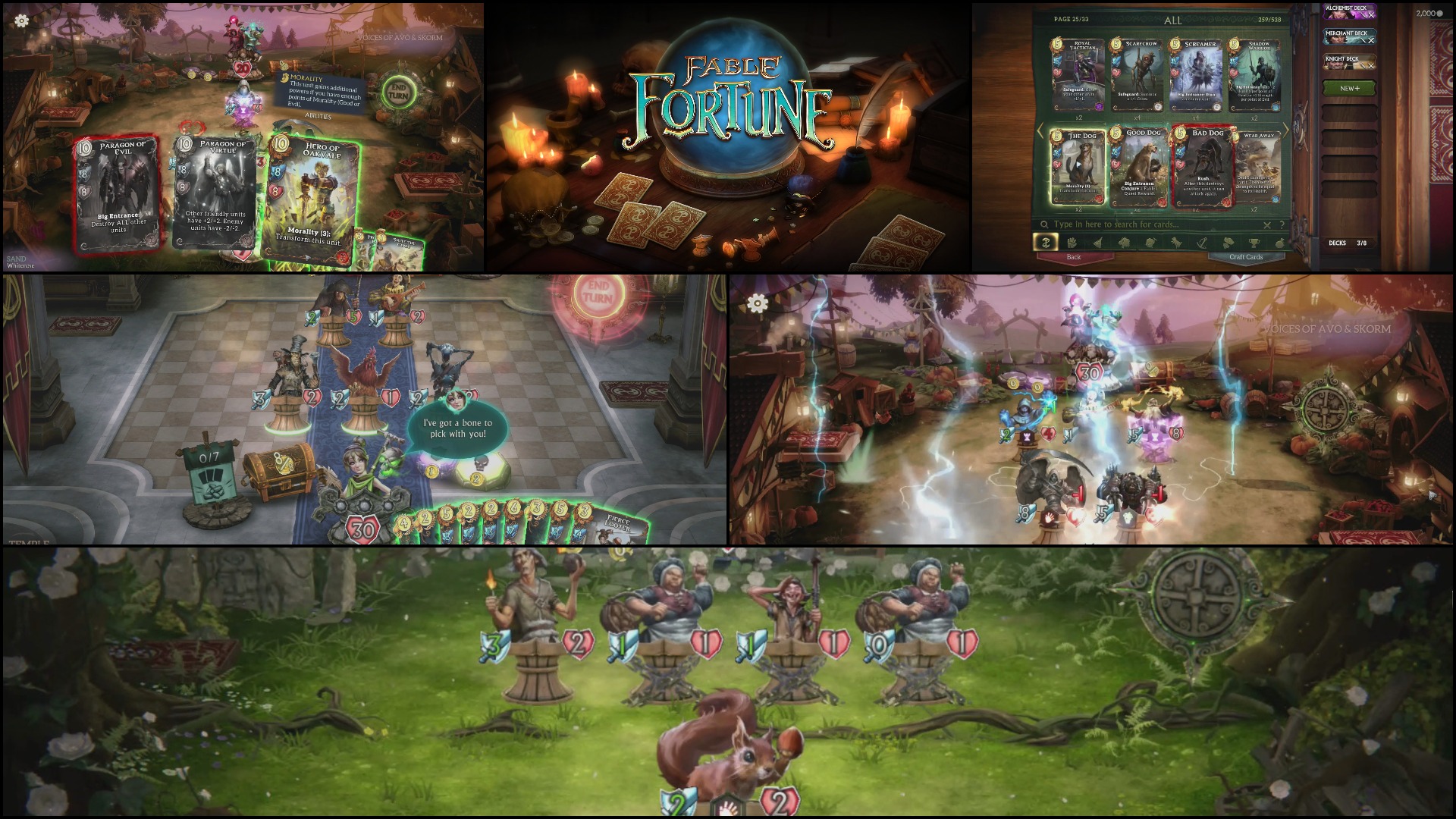
Fable IV
While rumoured as far back as early 2018, the new entry in the Fable franchise was officially announced and teased during E3 of 2020. Very little has been shared about the new game so far besides the strong indication that British studio Playground Games (known primarily for the Forza racing series) were manning the helm. Allegedly the success of Sony's exclusive single-player RPG 'Horizon: Zero Dawn' was Microsoft's inspiration to bring Fable back to the limelight.While strictly announced under the name 'Fable' (please publishers, stop this obnoxious trend), many are still referring to it simply as Fable 4 - possibly because the lack of specific details and the basic name suggests that the game could be returning to its open-world RPG roots of the main series after the various mediocre spin-off titles drew excitement for the brand relatively thin. This could quite easily be a reboot of Fable as we know it with completely unique story and gameplay, however.
Whatever this new game turns out to be, we at Opium Pulses sincerely hope that they do away with any trend predicting, gimmicky control schemes or companion apps (looking at you SmartGlass) and just focus on what makes the world of Fable so special. Give us old-English vibes, charming characters, tongue-in-cheek humour, a beautiful setting, atmospheric music, talented voice acting, and the freedom to do and be whoever we want. Remind the world why there is still a place for feel-good RPGs that make you laugh, smile and above all else... Fall in love with the world around you.
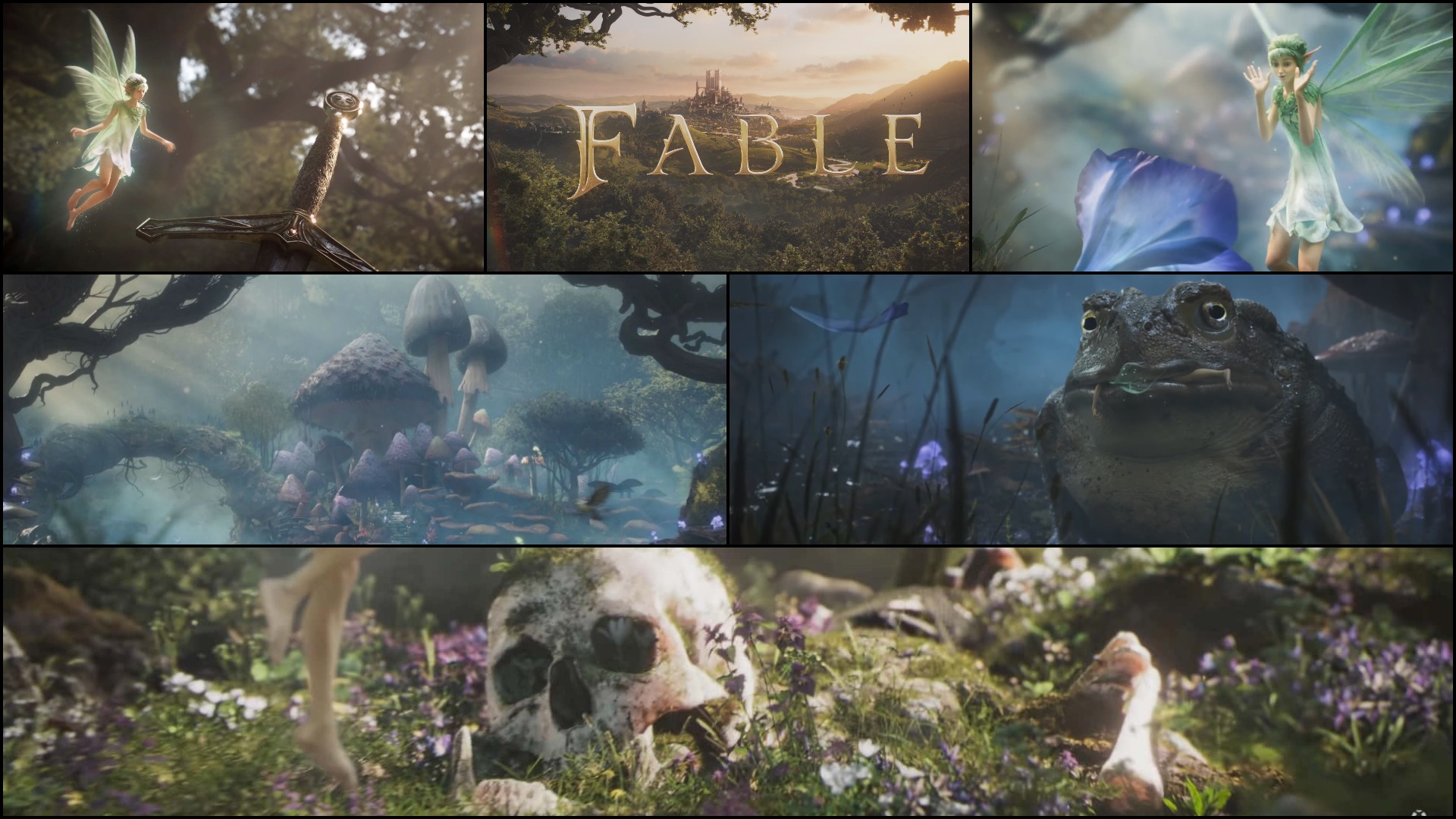
The Original Fable, but not The Fable.
Many are unaware that a video game named Fable existed before Lionhead Studio's 2004 release. And yet less than 10 years prior, Simbiosis Interactive released their one and only game 'Fable', a point-and-click adventure game in which you play a young man named Quickthorpe, similar to titles such as Monkey Island and King's Quest. In style, tone, setting and humour the two Fable games of 1996 and 2004 aren't too far away from each other, which does have you wonder why Lionhead decided to go with the Fable name at all, especially considering they had other names in mind.Fable was released in Europe during 1996 for both Windows and Microsoft DOS, however, players of the game were so disappointed by its overly dark ending that Simbiosis changed how the game story ended when releasing the game in North American to more closely match the title's self-aware and cheeky sense of humour. This didn't do much to satisfy people however and the game was rated somewhat averagely in both regions for its poor design and difficult to follow story, it was praised however for its decent voice acting, pleasing art style and fun humour.
There would be no sequel to this Fable and the studio responsible would close their doors shortly after the release of the NA version of the game. It's seemingly impossible to pick up a legitimate copy of the game in digital format today which is a shame, as it's unlikely anyone will pick up the license to continue the story given that the Fable name is probably not available to use, despite Simbiosis' offering getting there first. In any case, we salute you Fable '96, if anything just for being an interesting tidbit to drop on those unaware of your existence. Good day to you.
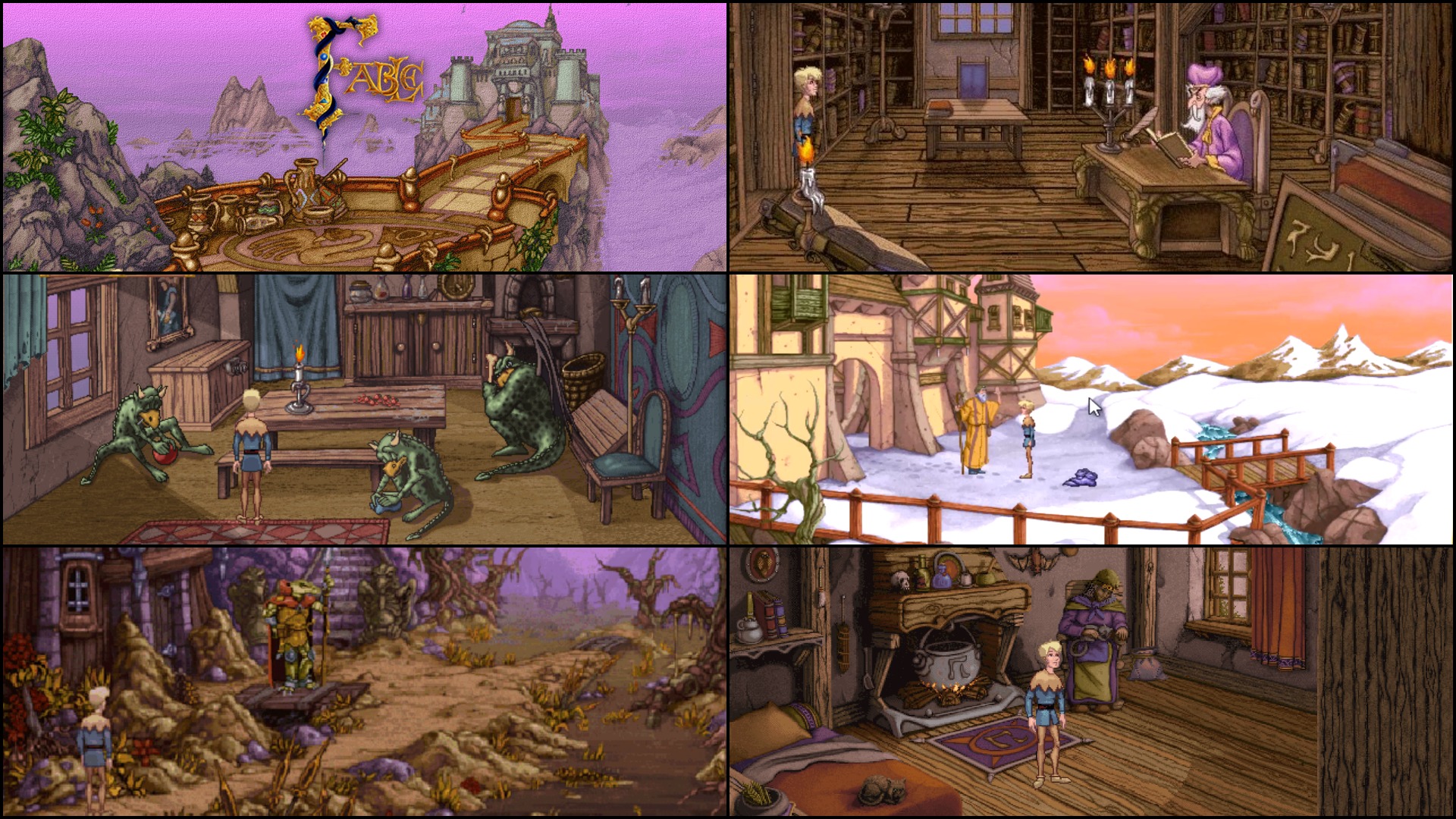
I have to admit, this article turned into a beast of its own during the time spent working on it, I discovered no less than three full games while researching the topic that I had no idea had even existed before putting finger to keyboard (this will one day replace the phrase 'pen to paper', mark my words). I hope as a reader you've learned something new about the Fable franchise too, as I think even the most dedicated fan can learn something from Fable's deep, forgotten and murky past.
I'd love to know what game in the series people consider to be their favourite and why, what game soiled the franchise for you and what are you most hoping for in the new title announced in 2020? Of all the unlisted and unplayable spin-off Fable games, which do you most wish you could experience or play again today? Anything Fable-related you'd like to get off your chest I'd love to hear in the comments.
It's been a journey writing this article and I only hope it was as fun for you to read as it was challenging for me to research. See you in Fable IV heroes!


